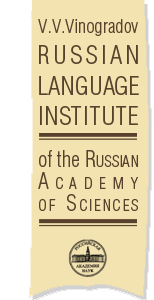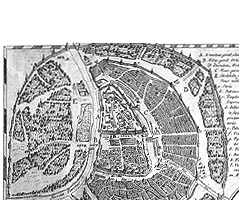The course is geared mainly towards the following categories of heritage Russian speakers:
- children of immigrants born in immigration whose linguistic  competence was formed entirely outside of Russia;
- children of immigrants born in Russia whose linguistic competence   had not been completely formed before immigration
Based on the research on the language of immigration and the recent findings (e.g., Glovinskaya & Zemskaya 2001, Andrews 1990, Pfandl 1997, Polinsky 1995, Polinsky 1997 etc.), the course is specifically designed to accommodate the linguistic needs of such speakers. The main problems of heritage speakers include various degrees of the following: impoverished vocabulary, imperfect grammar system, pronunciation and intonation affected by the language of their environment, rudimentary writing and spelling skills.
The course  is aimed at enhancing the following spheres of competence which traditionally are affected in the language of heritage speakers:
- spoken language and in particular, colloquial speech;
- written skills;
- reading.
вАЬRussian for Heritage SpeakersвАЭ is an intensive course, incorporating such components as Phonetics, Grammar, Lexicon as they apply to Conversation, Reading, and Writing. Language material for class activities is drawn from contemporary Russian literature and mass media.
Phonetics:
- intonation;
- consonant system:
1) loss of opposition of hard/soft sounds
2) loss of opposition of voiced/unvoiced sounds
         vowel system
1) loss of reduction
2) incorrect pronunciation of stressed vowels, especially [o]
¬†¬†¬†¬†¬†¬†¬†¬† incorrect use of phonetics-driven rules of lexical choice, e.g., choice of вАЬconsonantвАЭ VS. вАЬvowelвАЭ prepositions (k/ko, s/so, etc.)
¬†¬†¬†¬†¬†¬†¬†¬† foreign pronunciation of proper names (esp. names of places, such as Texas VS. Russian –Ґ–µ—Е–∞—Б, Hollywood vs. Russian –У–Њ–ї–ї–Є–≤—Г–і etc.)
Morphology:
1) expansion of certain forms at the expense of others, e.g. zero ending (e.g., incorrect –Љ–љ–Њ–≥–Њ –Ї–∞–Љ–µ—И–µ–Ї instead of –Љ–љ–Њ–≥–Њ –Ї–∞–Љ–µ—И–Ї–Њ–≤, incorrect –±–µ–Ј –≤—Л–Ї—А—Г—В–∞—Б instead of –±–µ–Ј –≤—Л–Ї—А—Г—В–∞—Б–Њ–≤, etc.);
2) destruction of the case system, e.g., loss of differentiation between genitive and prepositional cases in the plural form of nouns (e.g., –Њ—В –љ–µ—Б—З–∞—Б—В–љ—Л—Е —Б–ї—Г—З–∞—П—Е instead of –Њ—В –љ–µ—Б—З–∞—Б—В–љ—Л—Е —Б–ї—Г—З–∞–µ–≤);
3) morphological calques, e.g., incorrect use of singularia and pluralia tantum nouns (–Њ–і–µ–ґ–і—Л, —Б–њ–Њ—А—В—Л, –±–∞–≥–∞–ґ–Є instead of –Њ–і–µ–ґ–і–∞, —Б–њ–Њ—А—В, –±–∞–≥–∞–ґ);
1) destruction of the case system;
2) loss of agreement with nouns;
3) incorrect use of superlative;
4) incorrect use of short and full forms
1) destruction of the case system;
2) incorrect formation of ordinal and collective numbers
1) incorrect use of perfective and imperfective aspects;
2) overly extensive use of passive
Syntax:
- syntactic calques, such as the expansion of possessive construction with the verb –Є–Љ–µ—В—М;
- loss of subtle syntactic distinctions, such as differentiation between genitive and accusative with negation;
- mistakes in verb government (incorrect choice of preposition due to the influence of the language of the environment, contamination of government patterns of synonymic verbs etc);
- contamination of closely related yet distinct constructions, such as comitative construction and regular construction with the preposition —Б (e.g., –ѓ —Б –±—А–∞—В–Њ–Љ –њ–Њ–µ—Е–∞–ї–Є instead of –Ь—Л —Б –±—А–∞—В–Њ–Љ –њ–Њ–µ—Е–∞–ї–Є);
- word order
Lexicon:
- alternative or obsolete nominations of the Russian realia (in the absence of the exposure to the up-to-date language and culture);
- lexical borrowings from the language of the environment (e.g., –≥–Њ—Б–њ–Є—В–∞–ї—М instead of –±–Њ–ї—М–љ–Є—Ж–∞);
- lexical calques (e.g., –±—А–∞—В—М –і—Г—И instead of –њ—А–Є–љ–Є–Љ–∞—В—М –і—Г—И);
- combinatory mistakes (e.g., –ѓ –њ–Њ–ї—Г—З–Є–ї –Ї–Њ—В–ї–µ—В—Л instead of –Ь–љ–µ –њ—А–Є–љ–µ—Б–ї–Є –Ї–Њ—В–ї–µ—В—Л);
- mistakes in the choice of synonyms (e.g., —Б–Њ–і–µ—А–ґ–Є–Љ–Њ–µ –Њ–њ–µ—А—Л instead of —Б–Њ–і–µ—А–ґ–∞–љ–Є–µ –Њ–њ–µ—А—Л);
- mistakes in the choice of paronyms (—А–µ–≤–љ–Є–≤—Л–є vs. —А–µ–≤–љ–Њ—Б—В–љ—Л–є etc.)
Detailed outline is available upon request.
| 


